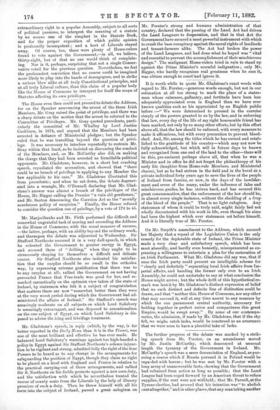The House even then could not proceed to debate the
Address, for on the Speaker announcing the arrest of the three Irish Members, Mr. Gray raised the point of privilege, and there was a sharp debate on the motion that the arrest be referred to the Committee of Privileges. Mr. Gray quoted precedents, parti- cularly the committal of Mr. Whalley by Lord Justice Cockburn, in 1874, and argued that the Members had been arrested in defiance of Ministerial pledges ; but the Speaker ruled that he was travelling beyond the question of privi- lege. It was necessary to interfere repeatedly to restrain Mr. Gray within that limit, as he insisted on discussing the conduct of the Members, and, as Mr. McCarthy also did, on making the charge that they had been arrested as formidable political opponents. Mr. Gladstone, however, in a short but crushing speech, repudiated the accusation, and showed that "there could be no breach of privilege in applying to any Member the law applicable to his case." Mr. Gladstone illustrated this from precedents ; and when he sat down, the debate degener- ated into a wrangle, Mr. O'Donnell declaring that Mr. Glad- stone's answer was almost a breach of the privileges of the House, Mr. Biggar calling the Premier " a vain old gentleman," and Mr. Sexton denouncing the Coercion Act as the "morally murderous policy of suspicion." Finally, the House refused to consider the question one of privilege, by a vote of 174 to 45.














































 Previous page
Previous page